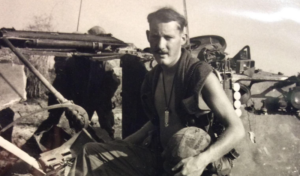
Vietnam Veteran Bill Clevenger learned that he had inoperable stage 4 non-small cell lung cancer completely incidentally. While undergoing imaging for an issue with his stomach, radiologists noticed spots on his lungs. Once biopsied, those spots were determined to be cancerous. While incidental findings are not that uncommon for lung cancer patients, what is unusual is that Bill knows definitively the origin of his disease: exposure to Agent Orange – a tactical herbicide used by the U.S. military to control vegetation during the Vietnam War. In 1968 Bill’s base camp for infantry was in tactical zone 3 which happened to be among the areas in which it was most densely dispersed. When asked how he knows that Agent Orange is responsible for his lung cancer, he responded,
“The VA told me and has taken full responsibility, covering all the costs of interventions and therapies.”
Biomarker Testing Beats Agent Orange and Lung Cancer
When Bill, now 77, received his diagnosis, he was told that he would likely not live beyond one, possibly two, years. That was five years ago. And, it is important to note: he reports feeling fantastic, and considers himself the luckiest guy in the world.
Biomarker testing showed that Bill’s lung cancer carries the EGFR mutation. As such, his treatment has included one round of chemotherapy followed by targeted therapy in pill form. The first year of treatment, he tolerated that medication fairly well, but did develop a rash which, at first, was annoying but manageable. Over the course of the next several months, the rash steadily worsened, resulting in a stage 4 rash which had Bill, in his words, looking like a tomato. Following an unannounced visit to the chemotherapy lab at the VA Hospital, his oncologist – who happened to be there – had him strip down so that he could assess the rash. It was quickly determined that Bill needed to stop taking that medication immediately. The good news: he left with a new medication to which he has responded well.
Stable Scans, Amazing Care from the VA
Bill has scans every three months and is thrilled to report that his disease is currently stable.
“If you didn’t know better, you would have no idea I have stage 4 lung cancer. I have no symptoms and, truthfully, feel fantastic. I have gotten amazing care at the VA. I feel so fortunate. My wonderful wife, Barbara has been my caretaker, my chef, my exercise coach, and the keeper of my medications. She is extraordinary.”
Agent Orange and Lung Cancer and The Moral Soldier
No story about Bill would be complete without sharing what a wonderful, calm, and lovely guy he is.
“My job in Vietnam was to kill people. Following my first firefight I became very religious. I like to think of myself as a moral soldier. One thing about having lung cancer: it is very humbling. You are forced to face your mortality and conquer that first estimate of how long you were going to live, and then keep on living.”
Despite Agent Orange and Lung Cancer, Life Goes On
Following Bill’s stint in the service (11 months and 25 days), Bill attended the University of Southern California, became a teaching assistant, and earned both a bachelor’s and master’s degree in cinema. He enjoyed a wonderful career as a cameraman in Hollywood, working on over 50 major motion pictures, allowing him to do what he loved every single day.
 Not one to sit idly by, during the first year of Bill’s unexpected diagnosis, he wrote a book, Point and Shoot about his time in the service. While he started out in the infantry, he soon became a combat photographer. He wryly notes that it was during that time that he received his only war injury: shrapnel in his hand. And, finally, during the time that he served, this reluctant hero earned both a Purple Heart and a Bronze Star. Thank you for your service, Bill.
Not one to sit idly by, during the first year of Bill’s unexpected diagnosis, he wrote a book, Point and Shoot about his time in the service. While he started out in the infantry, he soon became a combat photographer. He wryly notes that it was during that time that he received his only war injury: shrapnel in his hand. And, finally, during the time that he served, this reluctant hero earned both a Purple Heart and a Bronze Star. Thank you for your service, Bill.
Learn more about Agent Orange
Agent Orange was a tactical herbicide used by the U.S. military during the Vietnam War to clear dense jungle areas. It contained a highly toxic substance called dioxin, which has been linked to various health issues, including lung cancer and other respiratory cancers. The Department of Veterans Affairs (VA) has recognized that Veterans exposed to Agent Orange who have developed lung cancer, laryngeal cancer, tracheal cancer, and bronchus cancer are eligible for VA health care and disability compensation.
The VA provides support to affected Veterans through free Agent Orange Registry health exams. If a veteran served in Vietnam, Thailand, or the Korean Demilitarized Zone during specified time periods and has been diagnosed with respiratory cancer, they may be eligible for these benefits. The VA also funds research to better understand the long-term effects of Agent Orange and to improve treatments for veterans facing health issues related to their exposure.
Veterans who believe they may have been exposed to Agent Orange should contact the VA to learn more about available resources and support.
I’m using my lungs to advocate
As a member of LCFA’s Speakers Bureau, I’m advocating for research and raising awareness through the media, embodying hope and action.
View Speaker Profile
